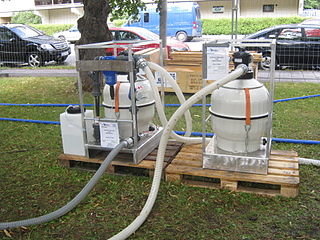
Eldoret is a city in the Rift Valley region of Kenya. It serves as the capital of Uasin Gishu County. Located in western Kenya, and lying south of the Cherangani Hills, the local elevation varies from about 2,100 metres (6,900 ft) at the Eldoret International Airport to more than 2,700 metres (8,900 ft) in nearby areas.

Environmental technology (envirotech) is the use of engineering and technological approaches to understand and address issues that affect the environment with the aim of fostering environmental improvement. It involves the application of science and technology in the process of addressing environmental challenges through environmental conservation and the mitigation of human impact to the environment.
Grundfos is the largest pump manufacturer in the world, based in Denmark, with more than 19,000 employees globally.

Off-the-grid or off-grid is a characteristic of buildings and a lifestyle designed in an independent manner without reliance on one or more public utilities. The term "off-the-grid" traditionally refers to not being connected to the electrical grid, but can also include other utilities like water, gas, and sewer systems, and can scale from residential homes to small communities. Off-the-grid living allows for buildings and people to be self-sufficient, which is advantageous in isolated locations where normal utilities cannot reach and is attractive to those who want to reduce environmental impact and cost of living. Generally, an off-grid building must be able to supply energy and potable water for itself, as well as manage food, waste and wastewater.

Portable water purification devices are self-contained, easily transported units used to purify water from untreated sources for drinking purposes. Their main function is to eliminate pathogens, and often also of suspended solids and some unpalatable or toxic compounds.

The developing nations of Africa are popular locations for the application of renewable energy technology. Currently, many nations already have small-scale solar, wind, and geothermal devices in operation providing energy to urban and rural populations. These types of energy production are especially useful in remote locations because of the excessive cost of transporting electricity from large-scale power plants. The applications of renewable energy technology has the potential to alleviate many of the problems that face Africans every day, especially if done in a sustainable manner that prioritizes human rights.

Ebara Corporation is a publicly traded manufacturing company based in Tokyo, Japan which makes environmental and industrial machinery such as pumps and turbines. It is the owner of the Elliott Company in the United States and Sumoto S.r.l. in Italy. Ebara also operates through its "WaterKiosk" partnership to supply clean drinking water in Kenya.
Kenya Pipeline Company (KPC) is a state corporation that has the responsibility of transporting, storing and delivering petroleum products to the consumers of Kenya by its pipeline system and oil depot network.

I&M Bank Kenya Limited, is a commercial bank in Kenya, the largest economy in the East African Community. It is licensed by the Central Bank of Kenya, the central bank and national banking regulator.

Chase Bank Kenya Limited(CBK), commonly referred to as Chase Bank, was a commercial bank in Kenya, licensed by the Central Bank of Kenya, the central bank and national banking regulator.
Guardian Bank, whose full name is Guardian Bank Limited, is a commercial bank in Kenya with headquarters in Nairobi. It is licensed by Central Bank of Kenya, the central bank and national banking regulator.

Xylem Inc. is a large American water technology provider, in public utility, residential, commercial, agricultural and industrial settings. The company does business in more than 150 countries. Launched in 2011 as the spinoff of the water-related businesses of ITT Corporation, Xylem is headquartered in Washington, DC, with 2018 revenues of $5.2 billion and 17,000 employees worldwide.

Tricel is a global engineering company headquartered in Killarney in County Kerry, Ireland. Tricel's four core divisions are Water Storage, Environmental, Construction, and Distribution. It has production sites in ten locations in Northern Europe, including Ireland, Britain Denmark, and France, which services customers in over 50 countries. As of 2012, Tricel employs 650 people and exports 75% of its products worldwide.
As of October 2015, there were more than 60 registered oil companies in Kenya.

Most of Kenya's electricity is generated by renewable energy sources. Access to reliable, affordable, and sustainable energy is one of the 17 main goals of the United Nations’ Sustainable Development Goals. Development of the energy sector is also critical to help Kenya achieve the goals in Kenya Vision 2030 to become a newly industrializing, middle-income country. With an installed power capacity of 2,819 MW, Kenya currently generates 826 MW hydroelectric power, 828 geothermal power, 749 MW thermal power, 331 MW wind power, and the rest from solar and biomass sources. Kenya is the largest geothermal energy producer in Africa and also has the largest wind farm on the continent. In March 2011, Kenya opened Africa's first carbon exchange to promote investments in renewable energy projects. Kenya has also been selected as a pilot country under the Scaling-Up Renewable Energy Programmes in Low Income Countries Programme to increase deployment of renewable energy solutions in low-income countries. Despite significant strides in renewable energy development, about a quarter of the Kenyan population still lacks access to electricity, necessitating policy changes to diversify the energy generation mix and promote public-private partnerships for financing renewable energy projects.
Lojer Oy is a privately owned Finnish medical technology company established in 1919. Lojer's headquarters are in Sastamala, Finland. In 2023 company employed 260 people in three countries, and reported annual revenues €61 million.

Kenya–Zambia relations are bilateral relations between Kenya and Zambia. Zambia is a partner of Kenya in many areas particularly trade, energy and agriculture.
Bank of India (Kenya) is a commercial bank in Kenya. It is one of the commercial banks licensed by the Central Bank of Kenya, the national banking regulator.
The House of Dawda Group is a privately owned conglomerate in Uganda.
Mombasa Mainland Desalination Plant (MMDP), is a planned water purification project in Kenya.













